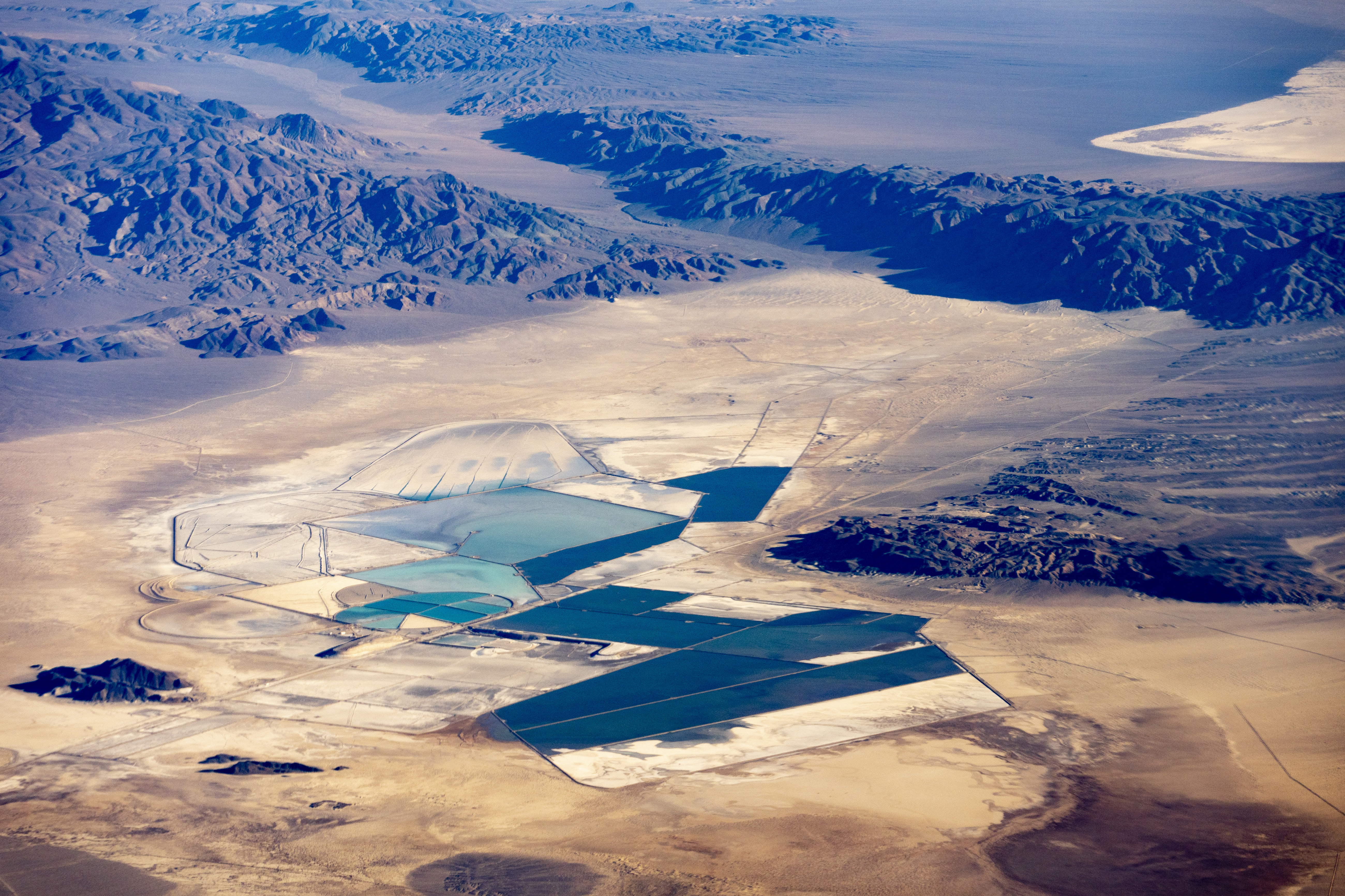Is lithium America's next gold rush?
Building a fleet of climate-friendly electric vehicles depends on it


A free daily email with the biggest news stories of the day – and the best features from TheWeek.com
You are now subscribed
Your newsletter sign-up was successful
Call it a 21st-century gold rush: The rise of the electric vehicle industry has set off a chase to discover and control domestic lithium deposits so crucial to making new car batteries, Vice News reported. Across the American West, prospectors are "racing to stake as many claims as they can" — hoping to cash in on the sudden explosion of demand. Why? Right now there is just one active U.S. mine producing the silvery-white metal.
The 49ers went to California in search of gold. Some 23ers are making their home there too, in what some are calling the "Lithium Valley," CBS' 60 Minutes reported. One executive said the region could eventually "recover enough of the metal to support 7.5 million electric vehicles a year" — about half of all vehicle sales in America. Texas is getting in on the action too: Tesla this month started production on a lithium refinery, Reuters reported. The continued growth of the EV industry depends on such efforts, said Elon Musk, who called lithium access a "fundamental choke point" in the industry's advance.
Lurking in the background: Competition with China. Sixty-seven percent of the world's lithium supplies are currently refined in that country, The New York Times wrote. The U.S. might be slow to catch up — "local and environmental concerns" are slowing down the effort to ramp up production here. Indeed, the Sierra Club called lithium batteries "clean power at a steep price." What is lithium's promise? And what is the peril?
The Week
Escape your echo chamber. Get the facts behind the news, plus analysis from multiple perspectives.

Sign up for The Week's Free Newsletters
From our morning news briefing to a weekly Good News Newsletter, get the best of The Week delivered directly to your inbox.
From our morning news briefing to a weekly Good News Newsletter, get the best of The Week delivered directly to your inbox.
What are commentators saying?
Lithium poses a paradox, Marco Tedesco wrote for Columbia Climate School. While the cause of "electrifying cars and other aspects of our society" requires a transition away from carbon-based fuels that warm the climate it is also true that "the transition may not be as efficient as we believe." Producing lithium batteries creates carbon dioxide pollution that the EV revolution is ostensibly designed to counteract, and the process is water-intensive: "To extract one ton of lithium requires about 500,000 liters of water" and that can create a lot of attendant pollution. That means even as lithium use rises, we should still be looking for alternatives: "Otherwise, we are just going in circles."
Such concerns are probably overblown, Brad Templeton argued for Forbes. As demand grows for lithium, "efforts will be made to mine it more efficiently and less destructively" especially as policymakers respond with environmental laws. While lithium is currently both difficult and messy, the need to produce a generation of electric vehicles — and the big businesses that plan to profit from them — will create solutions. "When a problem is important, and a huge amount of money is involved, solutions will be found if physics allows them."
That means environmental activists have to make an uncomfortable choice, Daniel Litvin noted for the London School of Economics. "Environmental activists need to ramp up engagement and collaboration with the mining industry if the energy transition is to be secured." A "grand bargain" between the lithium mining industry and environmentalists needs to be struck, in which miners agree to meet higher pollution standards and green-minded folks give quicker assent to "genuinely responsible" projects. A "collaborative mindset" will be "a key plank of global climate action in the years ahead."
What's next?
The race to take advantage of lithium is a global affair. Canada is positioning itself as a source of the metal for the North American car market, while a Bolivian company is hoping that the country's rich lithium reserves will help it jump-start a tiny car manufacturer. India, meanwhile, just announced plans to open up its lithium reserves to auction later this year. Those are the possible winners, but there might be losers too: Indonesia, which had targeted 2025 to open its own battery production plant, is seeing those plans falter for a lack of lithium.
A free daily email with the biggest news stories of the day – and the best features from TheWeek.com
Alternatives may be on the way: Salt. Sodium-ion batteries "have been around for decades," CNBC noted, but fell by the wayside as lithium technology surged into widespread use. "The technology is now getting a second look." Similarly, GreenBiz reported researchers are looking at the possibility of producing lithium-sulfur batteries as a cheaper alternative to the current lithium-ion batteries.
America's conversion to clean energy depends on such efforts, said E&E News. The Biden administration's push to produce electric vehicles is a gamble "the U.S. will be able to secure enough critical minerals" to build all those new car batteries.
Joel Mathis is a writer with 30 years of newspaper and online journalism experience. His work also regularly appears in National Geographic and The Kansas City Star. His awards include best online commentary at the Online News Association and (twice) at the City and Regional Magazine Association.
-
 James Van Der Beek obituary: fresh-faced Dawson’s Creek star
James Van Der Beek obituary: fresh-faced Dawson’s Creek starIn The Spotlight Van Der Beek fronted one of the most successful teen dramas of the 90s – but his Dawson fame proved a double-edged sword
-
 Is Andrew’s arrest the end for the monarchy?
Is Andrew’s arrest the end for the monarchy?Today's Big Question The King has distanced the Royal Family from his disgraced brother but a ‘fit of revolutionary disgust’ could still wipe them out
-
 Quiz of The Week: 14 – 20 February
Quiz of The Week: 14 – 20 FebruaryQuiz Have you been paying attention to The Week’s news?
-
 How climate change is affecting Christmas
How climate change is affecting ChristmasThe Explainer There may be a slim chance of future white Christmases
-
 Why scientists are attempting nuclear fusion
Why scientists are attempting nuclear fusionThe Explainer Harnessing the reaction that powers the stars could offer a potentially unlimited source of carbon-free energy, and the race is hotting up
-
 Canyons under the Antarctic have deep impacts
Canyons under the Antarctic have deep impactsUnder the radar Submarine canyons could be affecting the climate more than previously thought
-
 NASA is moving away from tracking climate change
NASA is moving away from tracking climate changeThe Explainer Climate missions could be going dark
-
 What would happen to Earth if humans went extinct?
What would happen to Earth if humans went extinct?The Explainer Human extinction could potentially give rise to new species and climates
-
 Bacteria can turn plastic waste into a painkiller
Bacteria can turn plastic waste into a painkillerUnder the radar The process could be a solution to plastic pollution
-
 Florida has a sinking condo problem
Florida has a sinking condo problemUNDER THE RADAR Scientists are (cautiously) ringing the alarms over dozens of the Sunshine State's high-end high-rises
-
 Diamonds could be a brilliant climate solution
Diamonds could be a brilliant climate solutionUnder the radar A girl and the climate's best friend
